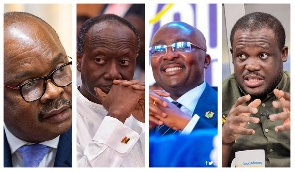The Member of Parliament for Ningo Prampram, Sam Nartey George, has expressed concern over the recent financial loss incurred by the Bank of Ghana, stating that the over GH¢60 billion lost could have provided over 3,000 district hospitals nationwide.
He asserted that the amount could have funded the ambitious Agenda 111 hospital projects, which aims to establish hospitals in various districts across the nation.
Speaking on a panel discussion on Metro TV’s Good Morning Ghana on August 9, 2023, he emphasized, "The Bank of Ghana in 2022 alone posted a loss of GH¢60.8 billion, do you know how many Agenda 111 hospitals that money can build? And there is one coming up in Ningo Prampram, and I am worried because that project has been stalled for almost six months."
According to the MP, GH¢60 billion could have been used to build 3,474 complete Agenda 111 hospitals, providing each district in the country with a facility.
He condemned what he referred to as "the gravity and enormity of the mismanagement" by the Governor of the Bank of Ghana, Dr. Ernest Addison, the Minister of Finance, Ken Ofori Atta, and the Vice President, Dr. Mahamudu Bawumia.
“That 60.8 billion cedis would have built 3,474 Agenda 111 hospitals completed, the money that they wasted in one year would have built 3,000…we would have had 100 district hospitals in every district. That is the gravity and enormity of the mismanagement of Ernest the printer, Ken the saint, and Bawumia the liar…they have created this mess and boldly wears white and come to Parliament and come and read this to us and tell us that there is nothing wrong with the country,” he added.
His comments come in the wake of growing calls by the Minority for Dr. Ernest Addison's resignation due to the substantial financial losses incurred by the central bank.
The opposition has seized upon the Bank of Ghana's loss as evidence of broader economic mismanagement by government officials.
Background
The Bank of Ghana incurred a significant loss in 2022 largely as a result of the DDEP, its 2022 Annual Report, and Financial Statement has disclosed.
According to the report, the central bank’s holdings of government debt were restructured whereas non-marketable holdings of Government of Ghana instruments including long-term stocks, a Covid-19 Bond, and overdrafts were subjected to a 50 percent haircut.
Bank of Ghana’s other claims (holdings of marketable instruments) were exchanged under similar terms as other financial institutions under the DDEP.
This led to an impairment of GH¢48.40 billion in 2022.
At the same time, the Central Bank incurred revaluation losses on its foreign assets and liabilities due to exchange rate depreciation. The impairments and revaluation losses led to a negative equity position of GH¢55.12 billion for 2022.
The report also stated that despite a healthy trade surplus, the balance of payments recorded a deficit of US$3.64 billion on account of significant net outflows in the capital and financial account.
This led to a drawdown of US$3.46 billion in Gross International Reserves from US$9.70 billion at end-December 2021 to US$6.24 billion at end-December 2022, providing 2.7 months of import cover.
The significant drawdown in reserves triggered immense currency pressures and the reduction in the Common Equity Tier 1 capital ratio to 5.5 percent, from 6.5 percent, and an increase in the maximum Tier 2 capital ratio to 3.0 percent, from 2.0 percent of total risk-weighted assets.
"Ernest The Printer, Ken The Saint & Bawumia The Liar" - @samgeorgegh on those responsible for the BoG loss#GoodMorningGhana #MetroTV pic.twitter.com/WdmU5GlT8S
— Metro TV Ghana (@metrotvgh) August 9, 2023
AM/SARA
Watch the latest episode of The Lowdown on GhanaWeb TV below:
Watch the latest episode of Legal Agenda on GhanaWeb TV below:
Watch the latest edition of BizTech and Biz Headlines below:
Share your news stories and ideas with GhanaWeb

To advertise with GhanaWeb


















